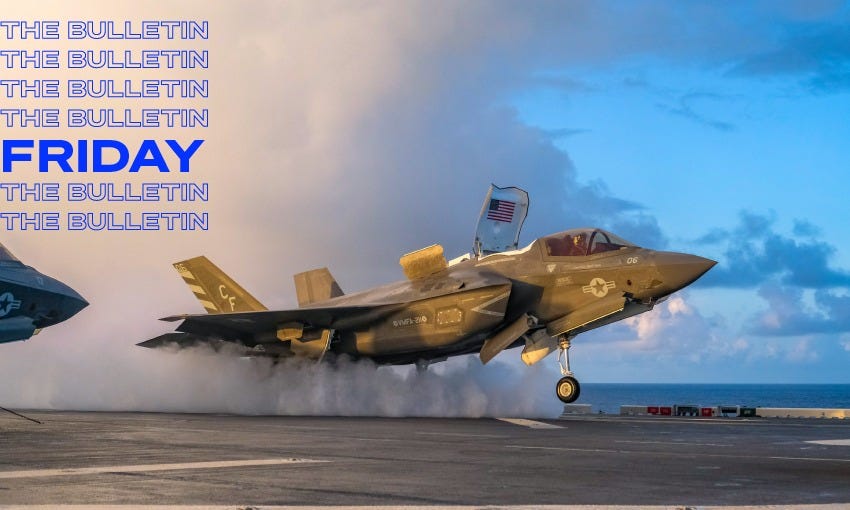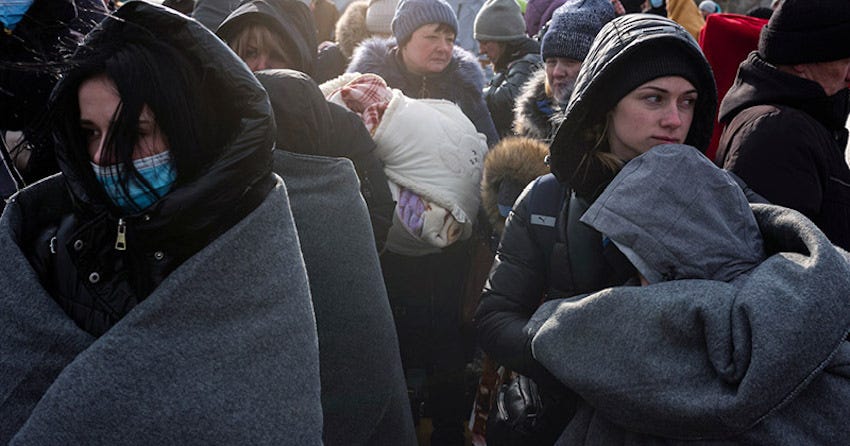What is a no-fly zone?
Controlling the airspace above Ukraine could protect locals from Russian airstrikes, or start World War III
Mōrena and welcome to The Bulletin for Friday, March 18, by Justin Giovannetti. Presented in partnership with Z Energy.
In today’s edition: Auckland hits omicron peak; new history curriculum unveiled; Transmission Gully to open this month; but first, the cases for and against a no-fly zone above Ukraine.
Aircraft like this US Marine Corps F-35B could enforce a no-fly zone. (Image: US Navy)
Ukraine’s president has asked for the west to ‘protect our sky’ from Russia.
Volodymyr Zelenskiy has called on western leaders to establish a no-fly zone over Ukraine to stop Russian airstrikes and cruise missile attacks. It’s a divisive request that has found little support from within the Nato military alliance, but Zelenskiy keeps asking and some groups have started advocating more forcefully. Foreign Policy reports that international relations scholars overwhelmingly oppose the idea, the only proposal with less support was a ground war against Russia. Why the lack of support? In short: A no-fly zone would commit Nato to an air war against Russia. It would mean the alliance, or some other military power, would designate Ukraine’s airspace as closed to Russia. When the other side disagrees, shooting starts.
A no-fly zone would likely start an immediate escalation in an unstable conflict.
Following the end of the first Gulf War, the US and a number of its allies imposed a no-fly zone over much of Iraq. The no-fly zone started with a massive attack on Iraq’s air force and air defence system. A no-fly zone is a not a peaceful measure, you can’t impose control of the sky when someone is shooting at you from the ground. There have been calls for a limited no-fly zone over humanitarian corridors, according to The Guardian. But there’s been little official support for the idea. Russia’s air force doesn’t control the sky over Ukraine. Despite trying to establish superiority, it has been mauled by old Soviet and modern surface-to-air missiles fired by Ukraine’s military. Forbes has reported on the challenge faced by Russian pilots.
There are humanitarian reasons to ignore the risk and control the sky.
While Russia has been pounding Ukraine’s cities with missiles and artillery in recent days, its air force has been responsible for scenes of mass death. Yesterday, Russian forces dropped a bomb on a theatre in Mariupol where hundreds of civilians were sheltering, according to the BBC. There were local reports that up to 1,200 people were in the building. A swimming pool where pregnant women and children were staying was hit in a separate airstrike. Writing in Politico, the former CEO of Airbus argued that Nato has “a moral and practical obligation” to protect the skies, at least in western Ukraine near the alliance’s member countries. Earlier this week, Russian missiles fell within 20 kilometres of the border with Nato member Poland.
It’s unclear if a no-fly zone is coming, but the war is certainly worsening.
This story has little to do with New Zealand. The country has no fighter planes and extremely limited air defence capability. It’s also been a laggard on sanctions. Aotearoa has so far refused to explain why it hasn’t sanctioned a high-profile Russian oligarch with numerous links to New Zealand business, Stuff reports.
While Zelenskiy and many Ukrainians have been thankful for the military and economic support they’ve received from the wider west, they remain deeply frustrated that the help hasn’t gone further. The Ukrainian president made his appeal directly to the US congress this week. As Reuters reports, Zelenskiy called on US President Joe Biden to be the world’s “leader of peace”. Some in congress now want to go further and labelled Russian president Vladimir Putin a war criminal. Putin himself has responded by calling Russians living overseas “traitors to the motherland”, according to the Miami Herald.
The generous support of our members powers all of The Spinoff's journalism, including live updates, the award-winning collaborations between Toby Morris and Siouxsie Wiles, and richly reported feature writing.
As we continue to struggle against commercial headwinds, contributions from our members are more critical than ever. If you value what we do and have the means to do so, please make a donation today and support our mahi.
Auckland has hit omicron peak as cases grow in rest of New Zealand.
There’s enough data now for health experts to conclude that the omicron surge is in retreat in Auckland, as daily cases numbers fall. 1 News reports that it’s unclear when the rest of the country will follow. While cases may have peaked in Auckland, the rate of hospitalisation remains high and there has been a record number of deaths from Covid this week. Doctors told Newshub they are angry at Ashley Bloomfield after the director-general of health said hospitals don’t face a crisis. Along with Covid, they are also worried about an increase in flu, RSV and whooping cough in the coming weeks.
New history curriculum ready for classes next year.
Jacinda Ardern said launching the new curriculum is one of her “proudest moments” as prime minister. The new history of Aotearoa New Zealand will include Te Tiriti, the development of the country’s national identity and its role in colonisation, including controlling other nations like Sāmoa. As Stuff reports, there will be a major focus on local histories, including those from nearby hapū and iwi. Ardern said New Zealand had been a global outlier as the country hadn’t done enough to teach its own history before now.
From our friends at Médecins Sans Frontières: At this crucial time, the team at Médecins Sans Frontières/Doctors Without Borders (MSF) are working to rapidly upscale their medical and humanitarian response in Ukraine. As hospitals become overwhelmed with war trauma patients, supplies are dwindling and with no knowledge of when Kyiv may be cut off entirely, MSF’s primary goal is getting medical supplies to where they are needed, as quickly as possible. Response teams are set up in Ukraine and surrounding countries, organising shipments of supplies from around the world to where they are needed most, but this exercise comes at a cost, and now MSF needs your help. Please donate now to support MSF’s medical response in Ukraine. (Sponsored)
Wellington’s Transmission Gully will open by end of the month.
After the new motorway missed five deadlines, the NZTA has had enough. Waka Kotahi directed the motorway’s contractors to open the long-delayed road within two weeks, the Dominion Post reports. Some quality assurance tests are unfinished, but the transport agency said the road is ready for public use. The road builders will be required to pay a daily fine until the project is finished. Local leaders were cautiously optimistic that this newest deadline will stick.
Repeating past mistakes in Māngere housing.
The government is planning a massive state housing development in the South Auckland suburb, replacing 2,700 existing state homes with 10,000 new homes, which will be a mix of state and market properties. Justin Latif writes for The Spinoff about local concerns surrounding the development. Many of the new developments are expensive, with only one or two bedrooms. Locals fear the new homes will drive gentrification and break up the communities that have lived in Māngere for generations. They want larger, more affordable units.
Got some feedback about The Bulletin, or anything in the news? Get in touch with me at thebulletin@thespinoff.co.nz
Don Rowe reports on what’s in the new history curriculum. Sam Brooks writes good riddance to Simon Bridges. Thalia Kehoe Rowden and her daughter Hazel review four new local shows for kids and tweens. Eridani Baker makes a case for anti-racism over diversity. Te Kuru o te Marama Dewes explores how traditional knowledge and new technology are preserving old pā sites on the East Cape.
White Ferns to meet England on Sunday in deciding match.
The team’s World Cup hopes hang in the balance after a loss to South Africa yesterday. It was New Zealand’s third loss in five games and it went down to the final with South Africa scraping by, RNZ reports. That’s how a lot of games have gone down recently. The Women’s Cricket World Cup has been all fine margins, writes Andrew Voerman for Stuff.













